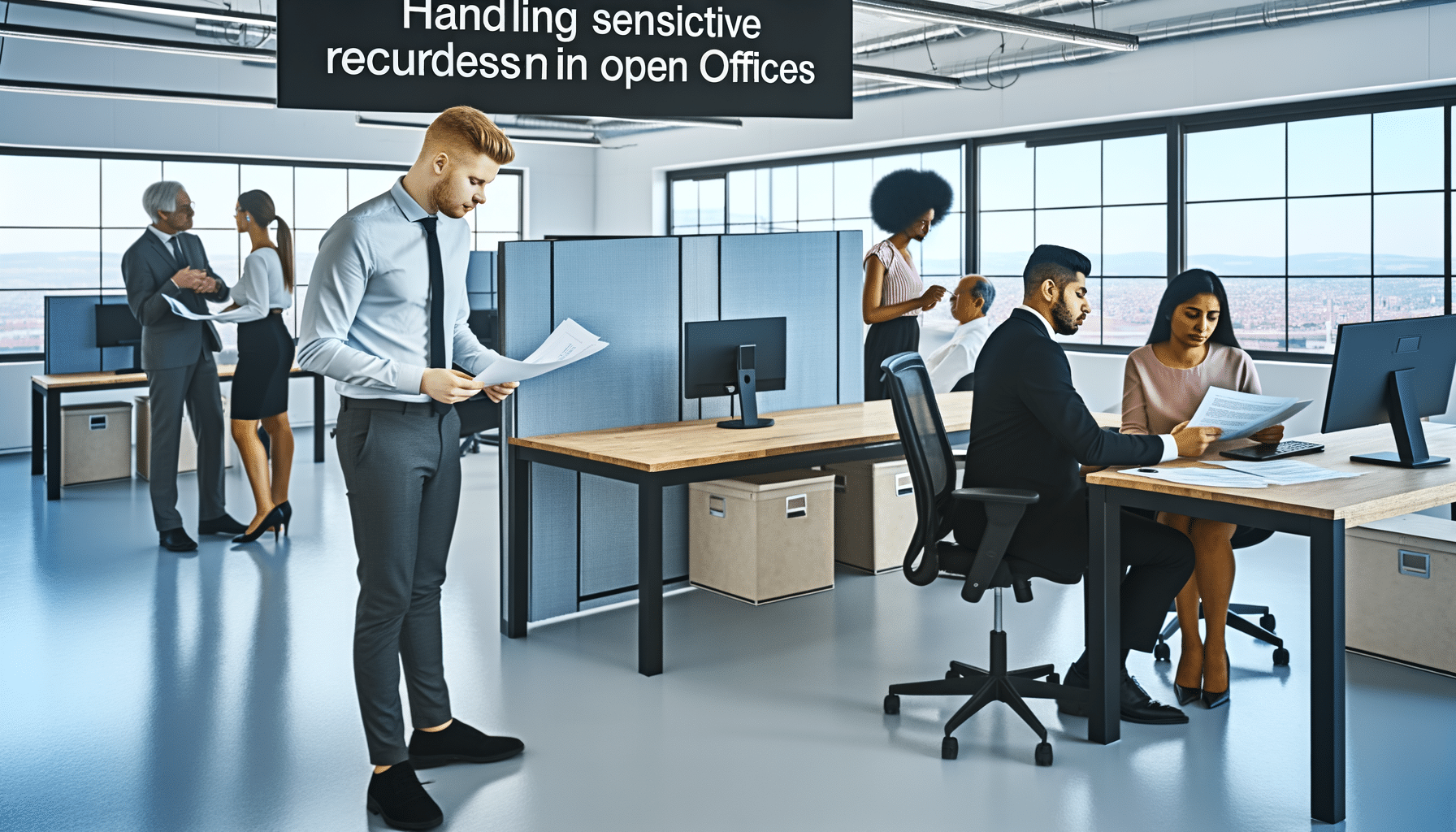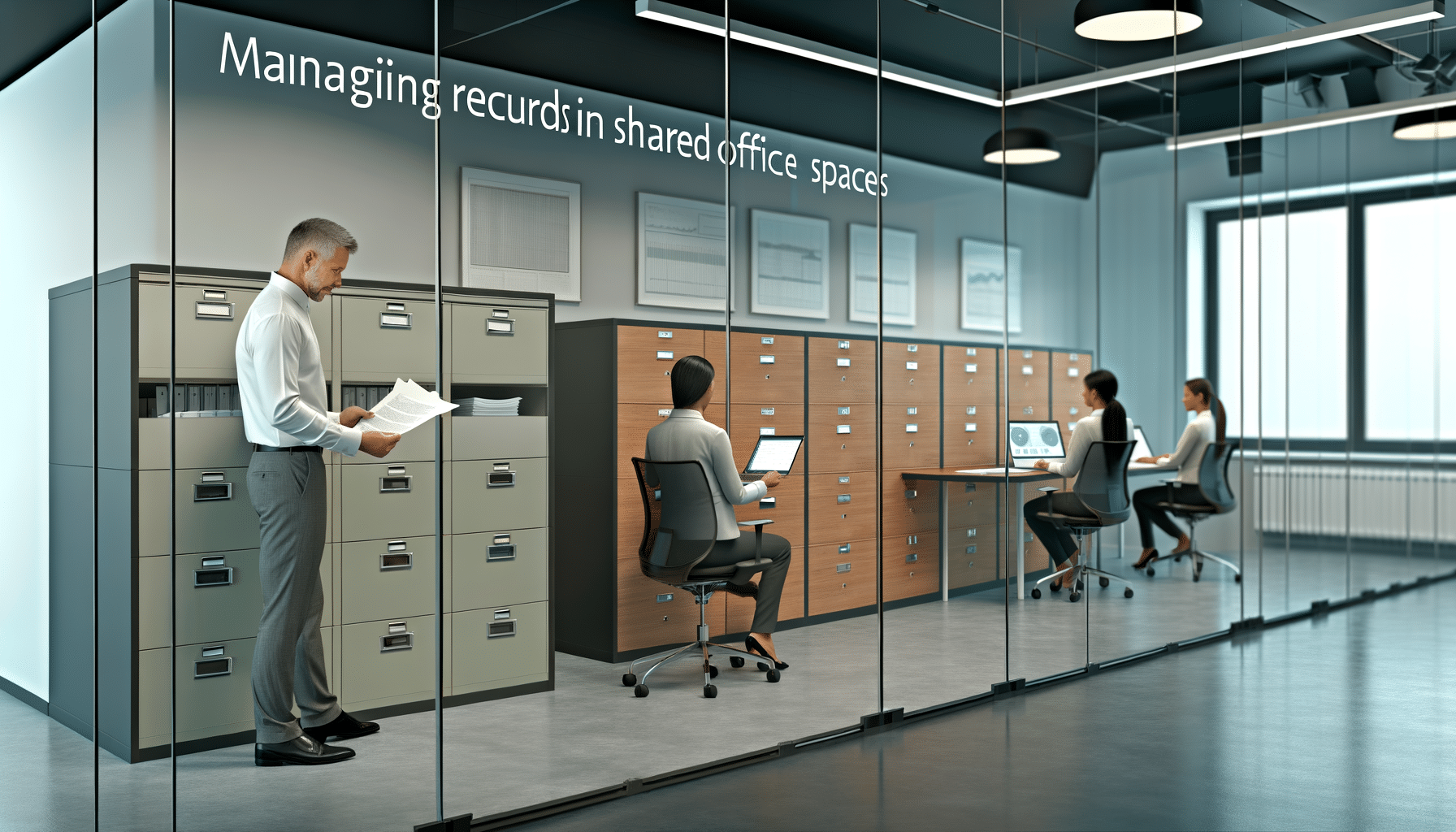- Archive Security
- December 9, 2024
Handling Sensitive Records in Open Offices

Addressing Privacy Challenges in Open Office Layouts
The modern trend towards open office layouts has revolutionized how we work. It fosters creativity, collaboration, and team communication. However, for those of us who handle sensitive records—legal, financial, or otherwise—this shift comes with unique challenges. How do we protect privacy in such an environment? I’ve faced similar dilemmas while developing RecordsKeeper.AI, and today, I aim to explore solutions that blend innovation with privacy mindfulness in open offices.
Understanding the Privacy Landscape in Open Offices
Open offices are known for their transparent structures with low or no separating barriers. While this boosts interaction, it also raises concerns about privacy breaches. Sensitive records, often rich in confidential information, are at risk without proper safeguards. This concern isn’t limited to the sharing of desk space; it also extends to verbal conversations and digital communications viewed over-the-shoulder.
For those of us invested in maintaining confidentiality, recognizing these vulnerabilities is the first step towards formulating solutions. Though the risks are pervasive, using smart strategies, we can secure sensitive records without impairing the dynamic benefits of an open workspace.
Adopting a Strategic Framework for Privacy
How can we maintain confidentiality in the bustling environment of an open office? The answer lies in a strategic approach that combines policy, technology, and savvy use of space.
- Policy Directives: Implement clear policies that educate staff about handling sensitive information responsibly. Clear guidelines on disk storage, usage, and conversations can set the foundation for privacy.
- Physical Layout Adjustments: While complete enclosure is contrary to open-office philosophy, strategic placements such as partitions or quiet zones can act as buffers against prying eyes and ears.
- Technology Integration: This is where platforms like RecordsKeeper.AI come into play. By automating record categorization and retrieval, ensuring secure data rooms, and managing compliance automatically, we can minimize manual data handling and safeguard privacy.
Leveraging Technology: A Game-Changer
We live in a time where technology provides robust solutions for privacy concerns. Through my work with RecordsKeeper.AI, leveraging blockchain and AI technologies has revealed tremendous potential in revolutionizing record management.
- Secure Data Rooms: These offer a virtual space where sensitive files can be shared securely, with controlled access and real-time tracking of activity. This can significantly reduce the risks associated with open-office setups.
- Automated Compliance Management: Automatic adherence to standards like GDPR and HIPAA can provide peace of mind to legal, finance, and compliance heads, knowing their sensitive records are consistently protected.
- Immutable Records with Blockchain: Recording data in a tamper-proof way helps ensure the integrity of sensitive records, providing an added layer of security against unauthorized changes.
Practical Tips for Balancing Privacy and Collaboration
Navigating the balance between maintaining privacy and promoting collaboration requires practical considerations. Here’s how you can achieve this balance:
- Cloud-Based Solutions: Utilize secure cloud storage with encryption to store records. This not only protects data but also allows access flexibility.
- Noise-Cancelling Headphones and Sound Masking: Reduce verbal privacy breaches with noise-cancelling tech or sound masking systems. By managing sound levels, you guard sensitive discussions within open-plan offices.
- Awareness and Continuous Training: Regular training sessions on data protection and privacy can keep staff informed of the best practices—fostering a culture of confidentiality.
Conclusion: Embracing a Privacy-Enhancing Culture
Integrating open office layouts doesn’t mean compromising on privacy. By implementing smart strategies—covering policy changes, technological advancements, and practical tips—we can strike a balance that safeguards sensitive records while thriving in collaborative work environments.
As we modernize record management with innovative solutions like RecordsKeeper.AI, I invite you to explore how your organization can turn these privacy challenges into strategic advantages. For more insights on securing your office environment while enhancing productivity, follow along with my journey at RecordsKeeper.AI. Let’s redefine what’s possible in open offices, together.
Toshendra Sharma is the visionary founder and CEO of RecordsKeeper.AI, spearheading the fusion of AI and blockchain to redefine enterprise record management. With a groundbreaking approach to solving complex business challenges, Toshendra combines deep expertise in blockchain and artificial intelligence with an acute understanding of enterprise compliance and security needs.
Related Posts

Managing Records in Shared Office Spaces
Keeping records secure in coworking and shared environments.
- November 23, 2024

Quick Tips for Digital Security Compliance
Practical steps for maintaining security compliance.
- November 17, 2024
Archives
- December 2024
- November 2024
- October 2024
- September 2024
- August 2024
- July 2024
- June 2024
- May 2024
- April 2024
- March 2024
- February 2024
- January 2024
- December 2023
- November 2023
- October 2023
- September 2023
- August 2023
- July 2023
- June 2023
- May 2023
- April 2023
- March 2023
- February 2023
- January 2023
- December 2022
- November 2022
- October 2022
- September 2022
- March 2019
Want to get more content like this?
Signup to directly get this type of content to your inbox!!
Latest Post
Document Control in Manufacturing Plants
- December 21, 2024
Handling Rush Financial Report Requests
- December 20, 2024
Managing Record Access After Staff Changes
- December 19, 2024
Setting Up Temporary Project Archives
- December 18, 2024





